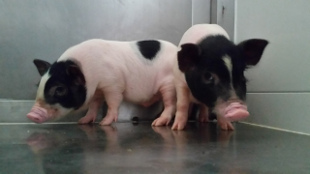 LIANGXUE LAI
LIANGXUE LAI
Update (July 6, 2017): BGI has dropped its plans to sell the pigs, according to MIT Technology Review. “Exactly why the plan got scrapped remains murky,” Tech Review states. “But distracting press coverage, negative public sentiment in China around GMOs, and uncertainty over how China plans to regulate gene-modified animals all seem to have played a role.”
In 2014, China’s BGI reported the creation of genetically-engineered Bama pigs that grow to be 15 kilograms, or 33 pounds. Last week (September 23), at the Shenzhen International Biotech Leaders Summit in China, the company announced plans to sell these “micro-pigs” as pets for approximately $1,600 each.
Originally, the micro-pigs were crafted for use in research labs. Pigs are more similar to humans than rats and mice are, ...





















